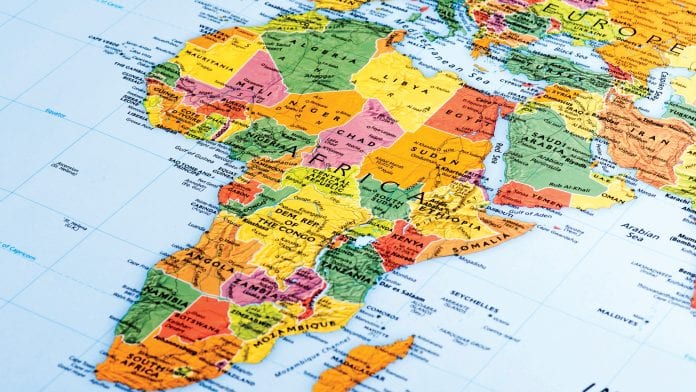
Cannabis cultivation has the potential to help Africa advance in more ways than one, and with increasing legalisation across the world, the continent may unlock potential income.
Africa is emerging as a player in the medical cannabis sphere at a spectacular rate and for good reason. It has been estimated that the legal cannabis industry could be worth more than USD 7.1 bn (~€6.2 bn) by 2023 if legislation is implemented across the continent. Does this mean Africa will join other countries across the world in cannabis cultivation, business and conversation?
Cannabis is by no means a newcomer to African farms, it is estimated that around 38,000 tonnes is already grown across the nation despite the fact that it remains illegal in most African countries, with many impoverished citizens turning to cultivating it due to the lack of employment opportunities and the decline in demand for tobacco. According to Prohibition Partners’ African Cannabis Report published in March 2019 “Poverty could be the driving force of cannabis legalisation in the region. A decline in demand for key cash crops, such as tobacco, is pushing the region’s governments to look for alternative income streams. Given that cannabis is grown illegally in large quantities across the African continent, full legislation and regulation could unlock the income potential for many African countries, particularly the leading tobacco growers Zimbabwe and Malawi.”
Indeed, companies looking to create or expand their cultivation operations in future would do well to consider Africa as a base when it has to offer low cost land ideal for cultivation and a labour force with extensive expertise in agriculture. However, this is not without challenges, as the legal status of medical cannabis varies from country to country and in some areas the legislation is unclear. The current legislation and regulatory framework has been categorised by Prohibition Partners’ report into 3 tiers:
Tier 1 – Leading the way
Countries that fall into Tier 1 show signs of moving forward with significant changes to the laws and policies on medical and/or recreational cannabis. It was widely reported that in September 2018, South Africa became the third African country to legalise cannabis after Lesotho (which legalised cannabis cultivation for medical use in June 2017) and Zimbabwe (which legalised the cultivation of cannabis for research or medical use in April 2018).
However, while South Africa’s legal provisions that previously criminalised the personal and private use of cannabis by adults were overruled, the order has been since been suspended for 24 months until parliament can amend the constitution. This means that there although criminal punishment has been lifted, South Africa’s cannabis market is still not regulated.
Tier 2 – Poised to move
Tier 2 countries and regional authorities are those which have active, ongoing reviews of medical and/or recreational cannabis laws and regulations. They are likely to embark on liberalisation within the short term. Currently, there are active campaigns to change the legal status of cannabis in Malawi, Morocco, Ghana and eSwatini. Kenya could follow in the paths of Lesotho and South Africa in the near future; there have been several petitions in the Kenyan Parliament requesting that cannabis be legalised.
In Egypt, Deputy Governor of Cairo MP John Talaat proposed a draft law in October 2018, which seeks to decriminalise cannabis, allowing users treatment instead of detainment. In 2015, Egypt’s Tobacco Merchants Association “submitted a proposal to the cabinet in order to legalise the trade and use of hash” (a drug made from cannabis,) arguing that the legislation would help “reduce the state budget deficit within a few years through imposing taxes”. However, the political reality of present day Egypt makes it unlikely there will be any quick resolution in favour of legalisation.
Tier 3 – Not yet ready for change
Tier 3 countries have historical or unique cultural characteristics that make it unlikely that there will be much, if any, liberalisation of medical and/or recreational cannabis markets in the short term. For a brief moment in March, 2017, Zambia seemed to be well poised to open for legislation on the use of medical cannabis.
The country’s Home Affairs Minister, Steven Kampyongo, stated that Zambia’s Narcotic Drugs and Psychotropic Substances Act, Cap 96 allows the growing of medical cannabis. However, in May 2017, the country’s Minister of Health Dr. Chitalu Chilufya stated he had no intention of issuing any medical cannabis licences.
There has not been any change in this stance, and although Zambian law has a provision for medical cannabis, until government ministers reach agreement, all cannabis use is illegal and subject to harsh penalties, often involving imprisonment for up 15 years.
South Africa
In April 2019 the South African Health Products Regulatory Authority (SAHPRA) announced their intention to issue cannabis cultivation licences for medicinal purposes, having previously published guidelines in 2017 on the cultivation of cannabis for medicinal purposes, confirming that “Cannabis-containing products intended for medicinal purposes may thus be made available, in exceptional circumstances, to specific patients under medical supervision. Authorisation is dependent on the submission of an appropriate dosage regimen, an acceptable justification for the proposed use, and regular reporting to the MCC.”
The announcement in April built on the foundations of this with the document intended to “provide the legal framework for the cultivation and processing of cannabis as a herbal starting material for the production of registered medicines.”
Within the official release SAHPRA confirmed that they had received 21 applications for the cultivation of cannabis for medicinal use between March and December 2018, with one applicant withdrawing their request. They went on to expand that “Of the 20 remaining applications, 16 sites were inspected in terms of their compliance with the requirements for cultivation as published in the guidelines. The remaining four (4) sites were scheduled for inspection in the first quarter of 2019. Of the 16 inspected sites, 12 sites were found to be non-compliant, as they did not meet minimum requirements needed (e.g. security measures were non-existent). Four (4) sites were found to have minimal deficiencies and were re-inspected. One (1) of these four (4) sites had minor deficiencies which were noted during the second round of inspection. The applicant has agreed to address these concerns. The remaining three (3) sites have been issued with letters advising them that they are compliant with the required standards for the cultivation of cannabis for medicinal use and will be issued with the cultivation licences, to which cultivation conditions will be attached.
The licences for the cultivation of medicinal cannabis will be valid for five years. All three of the sites to be licensed have applied only for the cultivation of the herbal material. None has applied for (and hence are not approved for) the manufacture of medicinal products containing cannabis such as oil extracts. Nonetheless, all of the sites will need to comply with the standards as laid down in “Guide to Good Manufacturing Practices for Medicines in South Africa.””
Therefore, no cannabis containing medicines have been registered with SAHPRA as of yet, and so access to such products remains dependent on further applications through the section 21 procedure. New applications and reapplications for a licence to cultivate cannabis for medicinal purposes can be made using an online portal created by SAHPRA.
Research into the potential impact of cannabis as a medicine in Africa is ongoing. A recent piece published in the African Journal of Primary Health Care & Family Medicine stated:
“In January 2016, the Alcohol, Tobacco and Other Drug Research Unit (ATODRU) of the South African Medical Research Council (SAMRC) produced a policy brief evaluating the findings of a published systematic review of current evidence to inform the discussion. The review identified moderate quality evidence to support the use of medicinal cannabis for chronic pain, chemotherapy-induced nausea, vomiting, and multiple sclerosis, but the many formulations, dosages and routes of administration limit recommendations.
Subsequently, the SAMRC brought key stakeholders representing all nine faculties of health sciences at South African universities together on 08 February 2017 at the SAMRC Medicina Campus, Cape Town, to explore opportunities for conducting local research and clinical trials of medicinal cannabis and cannabinoids to inform local policymaking. The workshop identified three major research priorities:
- Conduct a national, multisite clinical trial of cannabinoids following identification of the optimal formulations, dosage and relevant clinical indications from the current evidence base to inform trial protocol development.
- Support exploratory research to quantify the prevalence and qualify the current use of extracts (e.g. oils) in the community to alleviate pain and other symptoms; methods to include are as follows, (1) community- or clinic-based cross-sectional surveys or online survey of general public, (2) cross-sectional surveys of practising general practitioners and/or specialists in pain clinics with respect to their knowledge of patient use of cannabis extracts through patient disclosure.
- Conduct qualitative evaluation(s) of possible barriers and facilitators to medical practitioners prescribing cannabis or cannabinoids for medicinal purposes, should it be legalised in the future.
Further to this meeting, a SAMRC-supported team of researchers evaluated the evidence for a trial of a cannabinoid for the management of pain related to HIV associated sensory neuropathy (HIV-SN). The team selected painful HIV-SN as the condition based on: (1) the high burden of HIV and HIV-SN in the South African population, despite availability of improved antiretroviral drug regimens, and (2) the absence of empirical evidence supporting the efficacy of pharmacological agents typically recommended for the management of neuropathic pain in this population group.
They limited their assessment to high-quality trials of greater than 12 weeks duration, included participants with at least moderate intensity pain at baseline and who met current recommendations for trial design in the field of chronic pain. The team concluded that clinical equipoise exists for a fixed dose THC: CBD oromucosal cannabinoid spray trial for the management of painful HIV-SN. This was based on the GRADE assessment, the absence of demonstrably effective alternative therapies for painful HIV-SN and the clinical need in people living with HIV. The team is currently working on a study protocol for a multisite trial that conforms with the current highest standards for trials of analgesic agents for chronic pain. The SAMRC will be releasing a Request for Applications (RFA) from groups interested in participating in trials in due course.”
The study noted that there remains confusion between the distinction of cannabis as a medicine, and its recreational use, and that in order to ensure the best outcome for patients who could benefit from medical cannabis use, the scientific community must come together and ensure they are involved in policymaking surrounding this issue.
References
- https://prohibitionpartners.com/2019/03/21/africas-legal-cannabis-market-could-be-worth-over-us-7-1-billion-annually-by-2023/
- https://prohibitionpartners.com/wp-content/uploads/2019/03/The-African-Cannabis-Report%E2%84%A2.pdf
- https://www.sahpra.org.za/documents/2674952b2.44_Cannabis_cultivation_Sept17_v2.pdf
- https://www.sahpra.org.za/documents/773202cd10.23_Media_Release_Cultivation_Licences_for_Medicinal_Cannabis_Apr19_v1.pdf
- https://www.ncbi.nlm.nih.gov/pmc/articles/PMC6018595
Please note, this article will appear in issue 10 of Health Europa Quarterly, which is available to read now.








After years on medications, my Multiple Sclerosis symptoms worsened with tremors on my right hand, numbness and tingling, muscle weakness and loss of speech. Fortunately last year, i learnt about ORGANIC HERBAL CLINIC and their Multiple Sclerosis alternative treatment ww w. organicherbalclinic. com, the treatment made a great difference for me, most of my symptoms including tremors, weakness and others gradually disappeared. I improved greatly over the 3 months MS treatment, its been a year since the treatment, i have no symptoms. I have a very good quality of life and a supportive family!
Hi Joanna,
Great! what a life changer good to hear that. Can you visit our community we are avid supporters of medical marijuana-based in British Columbia.
Email me thanks,
thegreenace (AT) thegreenace.ca